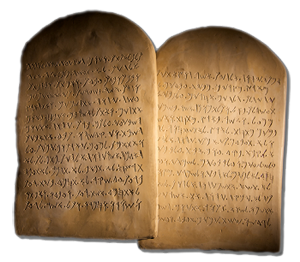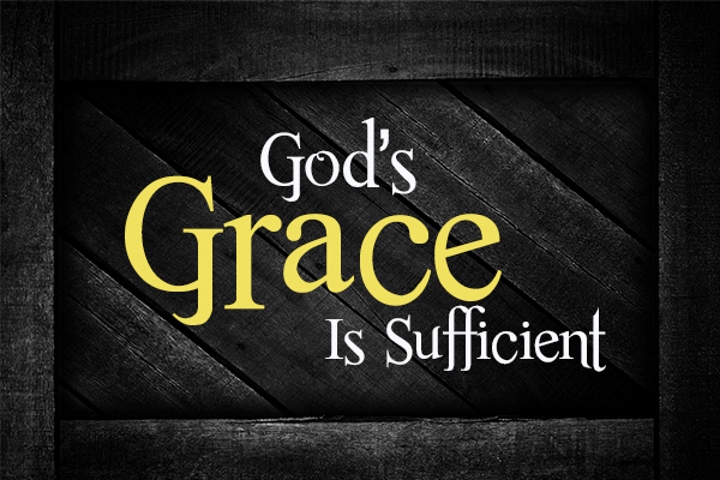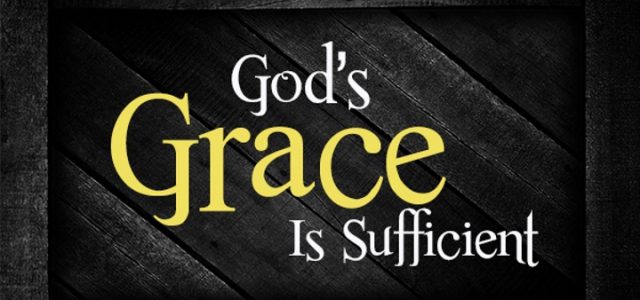by Bob Picard
There are no better examples in Scripture regarding how a “Believer” is treated in difftent dispensations than two, one found in the Old Testament (Law), and one found in the New Testament (Grace).

The first we find in the Prophet Ezekiel. God had told Ezekiel to do some rather strange things to portray God’s judgment upion the Nation of Israel. Now would be a good time to
point out that these are things which Ezekiel experienced, and there is no pattern to follow such practices today.
Now that that is out of the way. Let’s look at one such event found in Ezekiel 4.
Take thou also unto thee wheat, and barley, and beans, and lentiles, and millet, and fitches, and put them in one vessel, and make thee bread thereof, according to the number of the days that thou shalt lie upon thy side, three hundred and ninety days shalt thou eat thereof. And thy meat which thou shalt eat shall be by weight, twenty shekels a day: from time to time shalt thou eat it. Thou shalt drink also water by measure, the sixth part of an hin: from time to time shalt thou drink. And thou shalt eat it as barley cakes, and thou shalt bake it with dung that cometh out of man, in their sight. And the LORD said, Even thus shall the children of Israel eat their defiled bread among the Gentiles, whither I will drive them. Then said I, Ah Lord GOD! behold, my soul hath not been polluted: for from my youth up even till now have I not eaten of that which dieth of itself, or is torn in pieces; neither came there abominable flesh into my mouth. Then he said unto me, Lo, I have given thee cow’s dung for man’s dung, and thou shalt prepare thy bread therewith. Moreover he said unto me, Son of man, behold, I will break the staff of bread in Jerusalem: and they shall eat bread by weight, and with care; and they shall drink water by measure, and with astonishment: That they may want bread and water, and be astonied one with another, and consume away for their iniquity. – Ezekiel 4:9-17
In this account God told Ezekiel to take the ingredients mentioned, make barley cakes, cooked with human feces. This was to be a picture of Israel eating defiled bread among the Gentiles,
where God Himself would be driving them.
Obedient Ezekiel actually questioned Jehovah Himself: Then said I, Ah Lord GOD! behold, my soul hath not been polluted: for from my youth up even till now have I not eaten of that which dieth of itself, or is torn in pieces; neither came there abominable flesh into
my mouth.
God’s reply was quite astounding, especially when we look through the lens of the finished work of Jesus Christ, and the revelation of Him, as well as New Testament truth available to us today. Then he said unto me, Lo, I have given thee cow’s dung for man’s dung, and thou shalt prepare thy bread therewith.
Ezekiel had trusted the Lord, and refrained from eating unclean things, as well as handling unclean things – like human dung. God made provision for Ezekiel because of the Law.
Ezekiel said virtually the same thing that Peter would say many years later. Let’s turn our attention to the Apostle Peter in Acts 10:
On the morrow, as they went on their journey, and drew nigh unto the city, Peter went up upon the housetop to pray about the sixth hour: And he became very hungry, and would have eaten: but while they made ready, he fell into a trance, And saw heaven opened, and a certain vessel descending unto him, as it had been a great sheet knit at the four corners, and let down to the earth: Wherein were all manner of fourfooted beasts of the earth, and wild beasts, and creeping things, and fowls of the air. And there came a voice to him, Rise, Peter; kill, and eat. But Peter said, Not so, Lord; for I have never eaten any thing that is common or unclean. And the voice spake unto him again the second time, What God hath cleansed, that call not thou common. This was done thrice: and the vessel was received up again into heaven. – Acts 10:9-16
Again, Peter, having a vision (as a “big A” Apostle) is not the normative thing for a believer to do, as some may teach. The voice told Peter to kill, and eat, all matter of flesh that he had seen in the vision.
And saw heaven opened, and a certain vessel descending unto him, as it had been a great sheet knit at the four corners, and let down to the earth: Wherein were all manner of fourfooted beasts of the earth, and wild beasts, and creeping things, and fowls of the air. And there came a voice to him, Rise, Peter; kill, and eat.
Peter’s response:
Not so, Lord; for I have never eaten any thing that is common or unclean.
It was very similar to Ezekiel’s reply to God in Ezekiel 4:14:
…Ah Lord GOD! behold, my soul hath not been polluted: for from my youth up even till now have I not eaten of that which dieth of itself, or is torn in pieces; neither came there abominable flesh into my mouth.
The difference in God’s response tobot of them is of the utmost importance.

Ezekiel was under the Law, and was faithful to the Lord. So God made a provision so that Ezekiel would not go against God’s own Law (even if it was to represent the unclean Gentiles).
Lo, I have given thee cow’s dung for man’s dung, and thou shalt prepare thy bread therewith.
Peter was under a newer dispensation. The dispensation of Grace! Israel had rejected Jesus Christ aas her King, so that the message of the Gospel would now go out to all, not merely the
“elect” nation of Israel / Judah.
Because of the finished work of Jesus Christ, no flesh would be deeemed “off limits” to God’s provision of Salvation.
What God hath cleansed, that call not thou common.
The vision Peter had was not really about unclean food. It was about the formerly unclean Gentiles now being on the same level as God’s chosen nation.
You see, the Lord has made the forgiveness of sin available to each and every person in the WORLD.
And as Moses lifted up the serpent in the wilderness, even so must the Son of man be lifted up: That whosoever believeth in him should not perish, but have eternal life. For God so loved the world, that he gave his only begotten Son, that whosoever believeth in him should not perish, but have everlasting life. For God sent not his Son into the world to condemn the world; but that the world through him might be saved. He that believeth on him is not condemned: but he that believeth not is condemned already, because he hath not believed in the name of the only begotten Son of God. – John 3:14-18
Moreover, brethren, I declare unto you the gospel which I preached unto you, which also ye have received, and wherein ye stand; By which also ye are saved, if ye keep in memory what I preached unto you, unless ye have believed in vain. For I delivered unto you first of all that which I also received, how that Christ died for our sins according to the scriptures; And that he was buried, and that he rose again the third day according to the scriptures: And that he was seen of Cephas, then of the twelve: After that, he was seen of above five hundred brethren at once; of whom the greater part remain unto this present, but some are fallen asleep. After that, he was seen of James; then of all the apostles. And last of all he was seen of me also, as of one born out of due time. For I am the least of the apostles, that am not meet to be called an apostle, because I persecuted the church of God. But by the grace of God I am what I am: and his grace which was bestowed upon me was not in vain; but I laboured more abundantly than they all: yet not I, but the grace of God which was with me. Therefore whether it were I or they, so we preach, and so ye believed. – 1 Corinthians 15:1-11
The simple Truth is that God loves you in spite of your sin, and has sent His Son Jesus Christ to pay the penalty of death for your sin.

